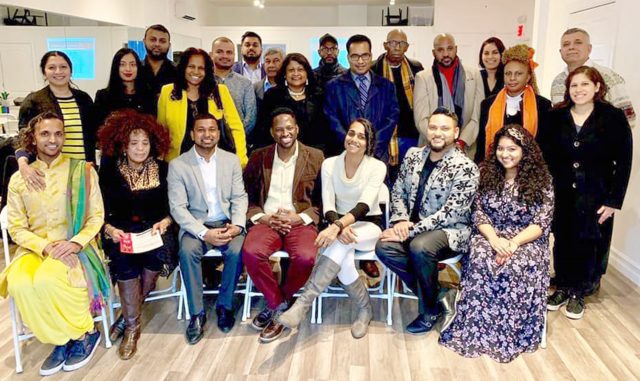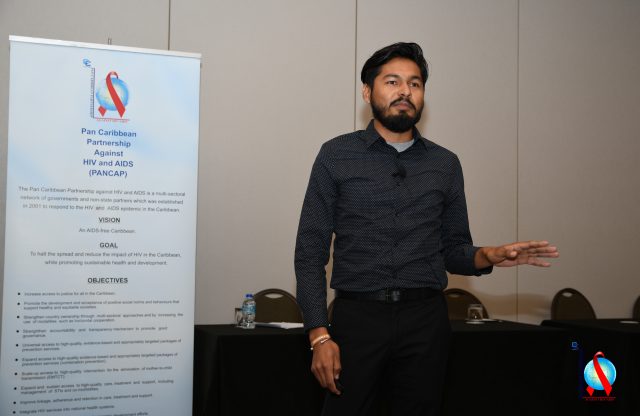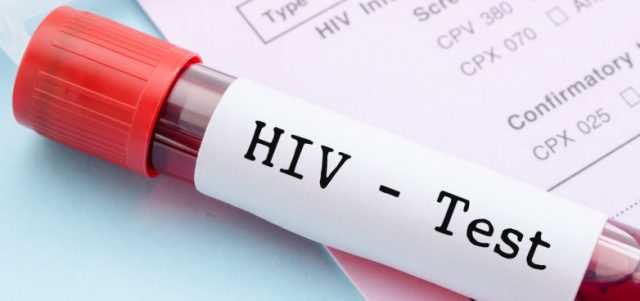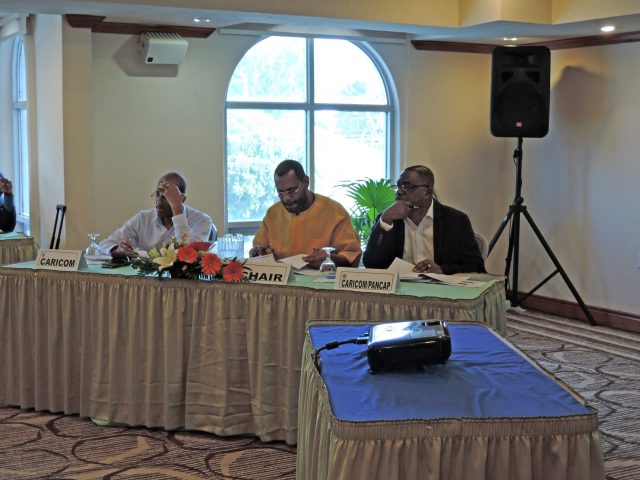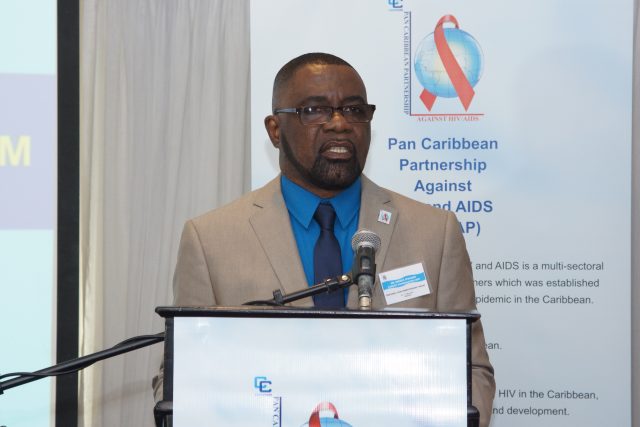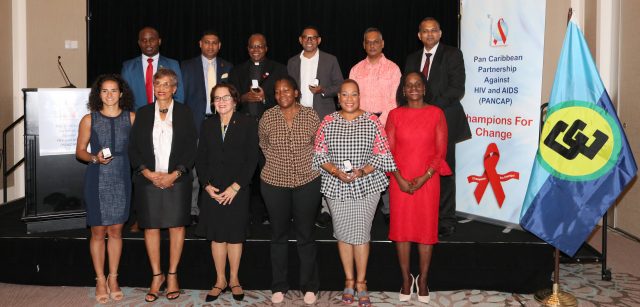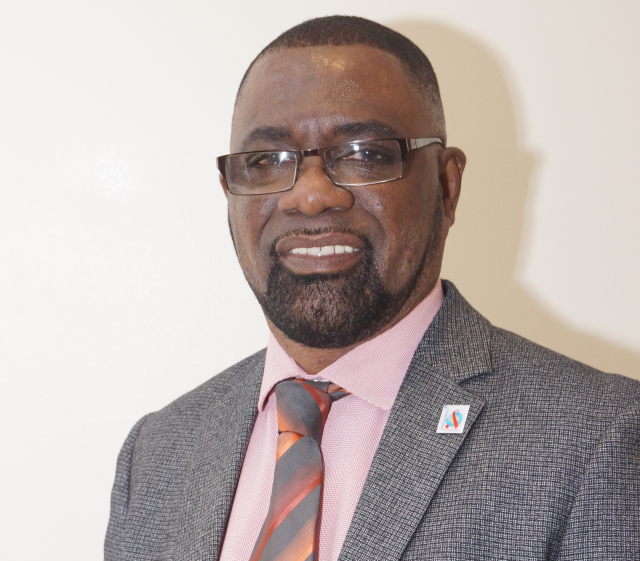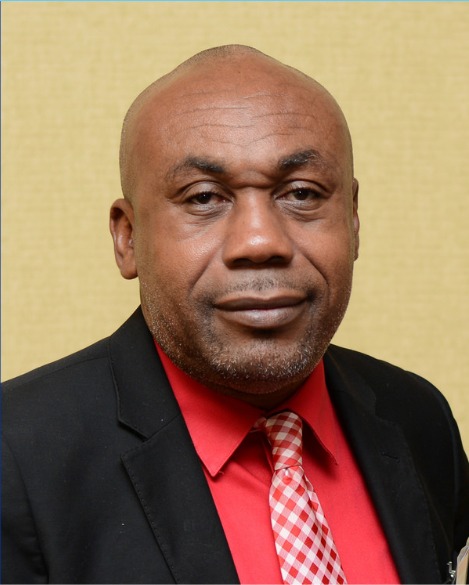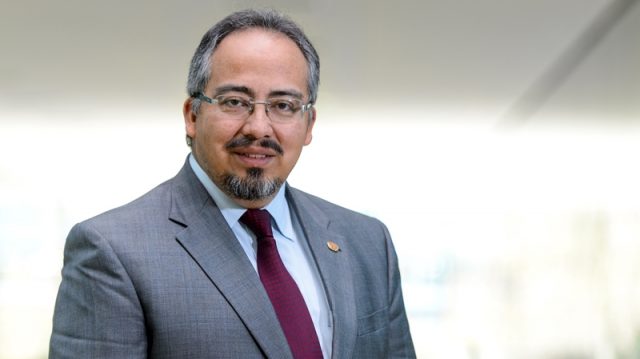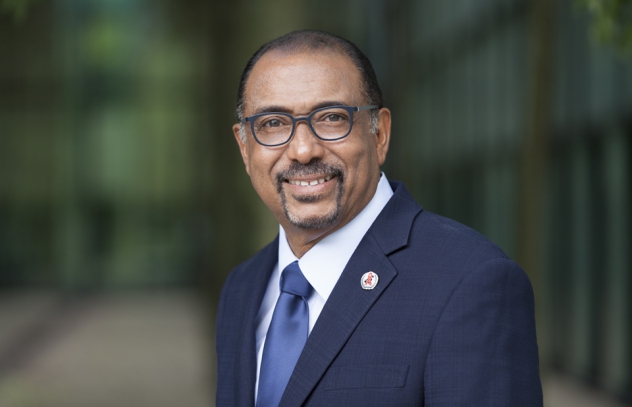FOR IMMEDIATE RELEASE:
Monday, 21 January 2019 (PANCAP Coordinating Unit, CARICOM Secretariat): The PANCAP Priority Areas Coordinating Committee (PACC), the technical group of the PANCAP Executive Board commissioned an evaluation of the Caribbean Regional Strategic Framework on HIV and AIDS (CRSF) 2014 – 2018. The PACC is responsible for the coordination and overseeing the implementation of operational plans for the CRSF.
The overall goal of the CRSF 2014-2018 was to halt the spread and reduce the impact of HIV in the Caribbean while promoting a sustainable response within Member States. The indicators developed to determine the overall achievement of the stated goal included the percentage of persons aged 15 – 49 years diagnosed with HIV in the last 12 months; percentage of children born to HIV-infected mothers who are infected; percentage of persons living with HIV (PLHIV) on treatment (ART) and virally suppressed; and Domestic and International AIDS spending by category and funding sources.
METHODS
The evaluation was conducted between April and November 2018 with three objectives: 1. Obtain feedback from the regional partners as to the progress, achievements, and gaps of the regional HIV response; 2. determine the level of implementation of the CRSF, the progress, achievements, gaps and challenges; and 3. provide clear recommendations on the strategic priority areas for the new CRSF and to inform its development.
The evaluation was conducted in two phases; Phase 1: Collection and analysis of survey data from a Partner Self-assessment and a Partnership Assessment; and Phase 2: Collection and analysis of data for key indicators of the CRSF 2014-2018 to help the Partnership determine the progress made, particularly in relation to impact and outcomes. During Phase 2, a virtual consultation was conducted among government and civil society partners from countries with the highest number of respondents to the partnership assessment to corroborate the perceptions obtained from the surveys and to determine whether the trends that emerged from the surveys remained or varied significantly. The draft evaluation report was reviewed by PACC members and amended to improve its analytic depth and clarity.
FINDINGS
The findings for each of the Six Strategic Priority Areas are presented in the full evaluation report.
The evaluation found that while the Caribbean has made progress in responding to the HIV epidemic, the impact of the prevention response has been inadequate, particularly among key populations. Of concern is that the annual number of new HIV infections among adults in the Caribbean declined by only 18% from 2010 to 2017, from 19,000 [14,000–31,000] to 15,000 [11,000–26,000]. Key populations, Men who have sex with men (MSM), Sex Workers (SWs) and their clients, and partners of key populations, transgender persons, and persons who use drugs, accounted for the majority of the new HIV infections (68%) during this period.
Conversely, new infections among children fell from an estimated 2,300 in 2010, to 1100. However, although significant progress has been made in eliminating mother-to-child transmission of HIV, available data for the period 2015 – 2017 showed that HIV infected pregnant women receiving ART to reduce HIV transmission declined from 92% in 2014 to 79% in 2015 and 75% in 2016 and 2017 respectively, illustrating a significant decrease that requires investigation.
There has been progress in placing more people living with HIV on treatment, however much more needs to be done to increase the numbers and to retain people on treatment. In fact, significant effort is required for the Caribbean to achieve the UNAIDS 90-90-90 Targets (90% of people living with HIV are aware of their infection, 90% of people diagnosed with HIV are linked to antiretroviral treatment (ART) and 90% of those on ART adhere and have undetectable levels of HIV in their blood). The gap to achieving the first 90 of the 90–90–90 Targets in 2017 was 54,800 people living with HIV [1].
The gap to achieving the first and second 90s of the 90–90–90 Targets in 2017 was 74,700 people living with HIV. The percentage of people living with HIV who achieved viral suppression increased from 37% in 2016 to 40% in 2017.
However, the gap to achieving all three 90s at the end of 2017 was the need for an additional 103,000 people living with HIV to be on ART and be virally suppressed. Given this situation, the Caribbean is at risk of not achieving the 2020 Targets.
Global financial resources to support the HIV epidemic have been progressively decreasing since 2011. However, domestic financing has improved during the implementation of the CRSF 2014-2018[2]. UNAIDS 2018, noted that “domestic resources increased between 2006 – 2017 by 124%, while international resources declined by 16%”[3]. As at the end of 2017, domestic resources were contributing significantly to the cost of ART and the overall treatment programme. Despite this trend, national resources to support services to achieve prevention continue to be low[4], with the implication that the gains could be reversed if this gap is not quickly filled.
The evaluation team proposed a number of overall recommendations for the goal as well as specific recommendations to address the gaps and challenges identified under each Strategic Priority Area. Additionally, the team proposed that the following Strategic Priority Areas should be retained in the new CRSF: An Enabling Environment, Prevention of HIV Transmission, Treatment, Care and Support, Integrate HIV into Health and Socioeconomic Development and Sustainability.
The evaluation team further proposed that a new Strategic Priority Area – Strategic Information, Monitoring and Evaluation, and Research, should replace Strategic Priority Area – Shared Responsibility to bring into sharper focus the importance of countries’ capacity to report on HIV data nationally, regionally and internationally, including on the CRSF indicators. Such emphasis would enable better reporting on, and profiling of the epidemic in the Caribbean. The main activities that fell under “Shared Responsibility” will be subsumed into the existing Strategic Priority Areas so as to ensure continuity of these initiatives in the new CRSF.
The Priority Areas Coordinating Committee, which was convened virtually on 10 January 2019 accepted the evaluation report. The PANCAP Executive Board which was convened virtually on 17 January 2019 also accepted the evaluation report and thanked those responsible for preparing the report; recognized that while the Caribbean has made progress much more needs to be done to achieve the targets; called on all countries and the Partnership to renew efforts to build capacity and work together to achieve the targets.
The Execute Board noted the legal judgments in Caribbean courts affirming human rights arising from litigation and called on countries not to wait on litigation but to make amendments to laws to recognize the rights of key populations and the rights of all to access sexual and reproductive health services. The board also noted that while tens of thousands of cases of HIV infections have been prevented there is a need to significantly reduce new infections, and this requires that countries promote age-appropriate sexual education and skills and extend sexual reproductive health services to all youth and key populations.
The board also called on all countries to introduce innovative prevention approaches and improve the quality of prevention services to ensure greater impact in reducing new HIV infections, and further called on the Priority Areas Coordinating Committee to develop a new Caribbean Regional Strategic Framework on HIV and AIDS for the period 2019 to 2023.
– ENDS –
Helpful links:
Caribbean Regional Strategic Framework on HIV and AIDS – https://pancap.org/who-we-are/caribbean-regional-strategic-framework/
Haiti Call to Action – https://pancap.org/pancap-releases/new-call-to-action-provides-guidelines-for-achieving-sustainable-hiv-responses-in-latin-america-and-the-caribbean/
What is PANCAP?
PANCAP is a Caribbean regional partnership of governments, regional civil society organizations, regional institutions and organizations, bilateral and multilateral agencies and contributing donor partners which was established on 14 February 2001. PANCAP provides a structured and unified approach to the Caribbean’s response to the HIV epidemic, coordinates the response through the Caribbean Regional Strategic Framework on HIV and AIDS to maximize efficient use of resources and increase impact, mobilizes resources and build capacity of partners.
What are the Joint United Nations Programme on HIV and AIDS (UNAIDS) 90-90-90 Targets?
- By 2020, 90% of all people living with HIV will know their HIV status.
- By 2020, 90% of all people with diagnosed HIV infection will receive sustained antiretroviral therapy.
- By 2020, 90% of all people receiving antiretroviral therapy will have viral suppression.
[1] UNAIDS 2018. Miles to Go: Closing Gaps, Breaking Barriers, Righting Injustices.
[2] http://www.unaids.org/sites/default/files/media_asset/unaids-data-2018_en.pdf
[3] ibid.
[4] UNAIDS 2018. Miles to Go: Closing Gaps, Breaking Barriers, Righting Injustices.

